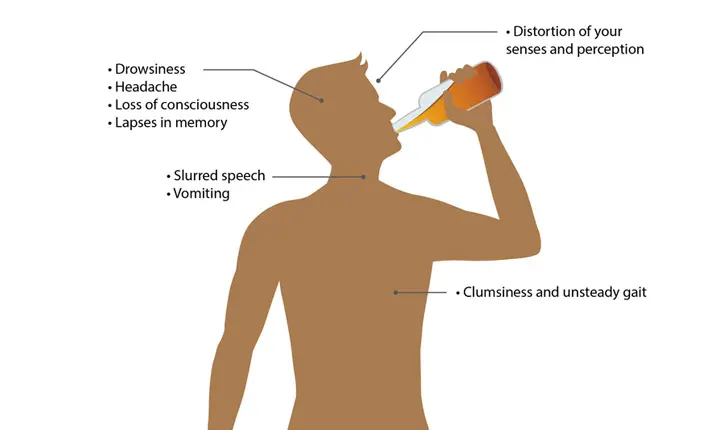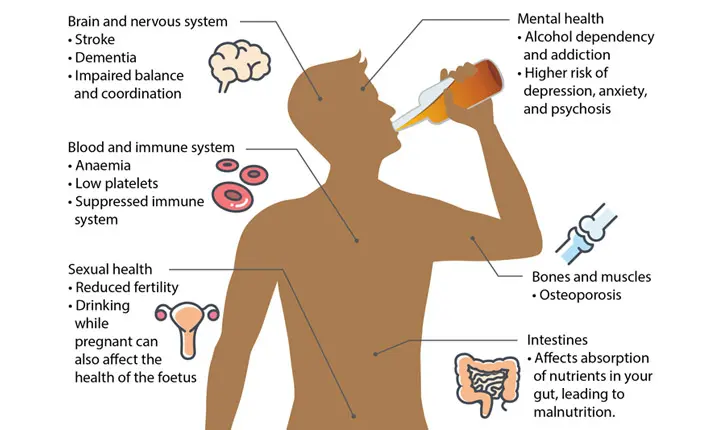-
-
Featured Care Areas


Source: Shutterstock
Alcohol: How It Affects Your Body
Last updated: Tuesday, October 29, 2019 | 4 min reading time
Besides harming your nervous system, long-term alcohol abuse can weaken your immune system, making it more likely for you to develop life-threatening health complications.
The World Health Organisation advises that alcohol kills 3 million people worldwide every year, with men particularly at risk. As Singapore becomes more prosperous, Singaporeans are developing a growing interest in alcohol.
A study released in 2016 estimated the prevalence of binge drinking in Singapore to be 9.6% of the population.
Why is alcohol harmful?
Alcohol is the intoxicating ingredient present in many alcoholic beverages such as wine, beer, and spirits. It is a depressant, which means that when it reaches your brain, it slows down your body's systems. It is OK for you to enjoy the occasional drink. However, long-term alcohol misuse can lead to various serious health conditions. Alcohol is a commonly abused substance with serious health, legal, and socio-economic implications.
Short-term effects of alcohol on your body
Within minutes of consumption, alcohol is absorbed into your bloodstream by blood vessels in the stomach lining and small intestine. It then makes its way through your blood stream to your brain, where it quickly produces its effects.
The short-term effects of alcohol vary depending on:
- How much is consumed
- The rate of consumption
- Your weight, gender, and body fat percentage
- Whether or not you have eaten
At first, you may feel relaxed, uninhibited, or giddy. As you consume more alcohol, you may begin to experience the following:
- Slurred speech
- Drowsiness
- Clumsiness and unsteady gait
- Headache
- Vomiting
- Distortion of your senses and perception
- Loss of consciousness
- Lapses in memory
Why do some people turn red after consuming alcohol?
You probably have that friend who turns red before finishing a first glass of beer. They may have an alcohol intolerance, insensitivity, or allergy to alcohol. Symptoms of alcohol intolerance include:
- Facial flushing
- Nausea and vomiting
- Worsening of asthma
- Diarrhoea
- Low blood pressure
Alcohol intolerance is caused by a genetic condition in which the body is unable to break down alcohol efficiently. In many cases, people who are alcohol-intolerant have a genetic mutation which is more common in Asians. Here are other risk factors for alcohol intolerance:
- Having asthma or hay fever
- Having an allergy to grains or other foods
- Having Hodgkin's lymphoma
Long-term effects of alcohol on your body
The occasional drink will not harm your body as much as it will someone who binge drinks frequently. In the long run, alcohol increases the risk of several cancers, including cancer of the liver, mouth, throat, oesophagus, voice box, colon, and rectum. However, having only a few drinks a week has been linked to an increased risk of breast cancer in women. Heavy, long-term alcohol use can also lead to alcoholic liver disease, which can lead to cirrhosis.
Long-term alcohol abuse can also affect your:
Blood and immune system
Chronic alcohol use can lead to anaemia, low platelets, and a suppressed immune system.
Bones and muscles
Heavy long-term use of alcohol can interfere with the absorption of calcium and bone formation. This can lead to other health complications such as osteoporosis.
Brain and nervous system
Long-term abuse of alcohol increases the risk of stroke and can lead to dementia or impaired balance and coordination.
Mental health
Not only does the risk of alcohol dependency and addiction increase with long-term alcohol use, heavy drinkers are at higher risk of depression, anxiety, and psychosis.
Sexual health
Long-term alcohol abuse can reduce fertility in both men and women. It also decreases a man's sex drive. Consuming alcohol while pregnant can also affect the health of the foetus.
Intestines
Chronic heavy use of alcohol can interfere with the absorption of vitamins and other nutrients in your gut, leading to malnutrition.
Moderation is key
Cutting back on the amount or frequency of drinking alcohol can reduce these risks. However, low-risk alcohol use does not mean no risk. Men are recommended to consume no more than 4 drinks on any day and no more than 14 drinks in a week. If you are a woman, that's no more than 3 drinks a day and no more than 7 in a week.
Drinking large amounts of alcohol within a short period of time can result in alcohol poisoning. With binge drinking occurring more commonly among those aged 13 – 34 in Singapore, it is important to drink responsibly. If you know or suspect that someone has alcohol poisoning, visit the Urgent Care Centre (UCC) immediately or call for an ambulance.
During a medical emergency in Singapore, you can also call +65 6473 2222 for an ambulance that will transport you to the nearest hospital or a hospital of your choice. Learn more about Parkway Emergency services.
Alcohol effects. Retrieved 18/06/2019 from https://www.webmd.com/mental-health/addiction/alcohol-effects#1
The Effects of Alcohol on Your Body. Retrieved 18/06/2019 from https://www.healthline.com/health/alcohol/effects-on-body#1
How Alcohol Affects Your Body. Retrieved 18/06/2019 from https://www.webmd.com/mental-health/addiction/ss/slideshow-alcohol-body-effects
What Happens to Your Body When You Binge Drink. Retrieved 18/06/2019 from https://www.healthline.com/health-news/what-happens-to-your-body-when-you-binge-drink#1
Alcohol intolerance. Retrieved 09/07/2019 from https://www.mayoclinic.org/diseases-conditions/alcohol-intolerance/symptoms-causes/syc-20369211
Alcohol Abuse Worse Among Young People. Retrieved 29/10/2019 from https://www.straitstimes.com/singapore/alcohol-abuse-worse-among-younger-people
The Effects of Alcohol on Your Body. Retrieved 18/06/2019 from https://www.healthline.com/health/alcohol/effects-on-body#1
How Alcohol Affects Your Body. Retrieved 18/06/2019 from https://www.webmd.com/mental-health/addiction/ss/slideshow-alcohol-body-effects
What Happens to Your Body When You Binge Drink. Retrieved 18/06/2019 from https://www.healthline.com/health-news/what-happens-to-your-body-when-you-binge-drink#1
Alcohol intolerance. Retrieved 09/07/2019 from https://www.mayoclinic.org/diseases-conditions/alcohol-intolerance/symptoms-causes/syc-20369211
Alcohol Abuse Worse Among Young People. Retrieved 29/10/2019 from https://www.straitstimes.com/singapore/alcohol-abuse-worse-among-younger-people










